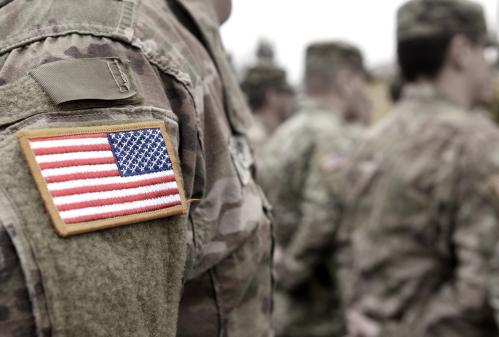One year ago, the United States and its allies invaded Iraq with the stated objectives of destroying Iraq’s weapons of mass destruction, removing Saddam Hussein from power, clamping down on global terrorism, and fostering democracy in a troubled region.
Today, at a Brookings Briefing, a panel of experts discussed the United States’ year-long involvement in Iraq and the ongoing diplomatic and military challenges.
“The invasion and the aftermath have not been the unqualified success that some of the proponents had hoped it would be,” said Brookings Senior Fellow James B. Steinberg. “But it also hasn’t been the immitigable disaster that some critics predicted.”
Although the military operation in Iraq was swift and successful, the United States has encountered several challenges since the fall of Baghdad in May 2003. Civil violence, suicide bombers, and security problems continue to hamper reconstruction efforts and hinder daily life for Iraqis and allied troops. Additionally, the Bush administration has been criticized for its failure to find weapons of mass destruction, and this intelligence failure has led many to question the administration’s motives for going to war.
“We have a real problem as a result of the intelligence failures on Iraq,” said Brookings Senior Fellow Kenneth Pollack. “I think that there was a lot of blame to go around. It is very clear that the intelligence community got it wrong. We did think that Iraq’s weapons of mass destruction were much more aggressive and advanced than they turned out to be.”
Pollack was quick to point out that the intelligence estimates weren’t entirely inaccurate. “There were programs there,” said Pollack. “[Former chief U.S. weapons inspector David] Kay’s report makes it clear that there were programs. But they were much smaller than we thought at the time.”
Such intelligence failures, said Pollack, presented unique challenges for the future of American military efforts. Although Pollack believes that foreign governments will continue to trust American intelligence assessments, despite recent intelligence failures, their constituents may not be as sympathetic. With the majority of foreign citizens apparently opposed to the Iraq war—and distrustful of the United States—Pollack fears that public sentiment will make it difficult for governments to ally with the United States in the future.
According to several panelists, the intelligence failures were particularly troubling because of the Bush administration’s doctrine of pre-emption.
“If we’re going to develop a set of policies that are going to be based on predictive intelligence,” said Steinberg, “we have to look at the interface between the inherent uncertainties in intelligence and the very consequential policy decisions that may float from getting it right or getting it wrong.”
For Pollack, Iraq’s future remains uncertain.
“This country could go in either direction,” said Pollack, who added that the glass was 2/5 full, in his opinion.. “Fifteen years from now, it could be stable pluralist society—a model of what we’d like to see the Middle East becoming—or it could become absolute chaos.”
Brookings Senior Fellow Michael O’Hanlon responded by saying that, for him, “the glass is 3/5 full in Iraq. The invasion was easier than I thought and the post-war more difficult than I thought.”
O’Hanlon said that there are plenty of reasons to be optimistic about the situation in Iraq, including progress being made in the availability of gasoline, oil production, and electricity output. Additionally, American troop casualties and attacks against coalition forces have declined in recent weeks. On the other hand, however, O’Hanlon was troubled by increasing numbers of suicide bombings against Iraqis.
“Iraq remains several times as violent as the most violent American city,” said O’Hanlon. “It’s not the kind of environment where people are going to have confidence in their future, and in their ability to build a life for their families.”
Brookings Senior Fellow Shibley Telhami examined the foreign reaction to the U.S.-led war in Iraq and said the results of the war reinforced suspicions and doubts in the minds of many in the Arab world.
“This administration has projected a psychology of unpredictability,” said Telhami. “The prediction of the public [in the Middle East]was exactly the opposite of what the United States was saying. The vast majority thought the Middle East would become less democratic—not more. They expected more—not less—terrorism. They thought the prospect for Arab Israeli peace would decrease—not increase.” Telhami added that the majority of people in the Arab world ultimately want U.S. efforts in Iraq to be successful (for fear of the alternative), but fear that quick, decisive success will only lead to similar military endeavors by the United States.
The U.S. image has been tarnished not only in the Middle East, but in Europe as well, according to Philip H. Gordon. Gordon said that the Bush administration’s march to war resulted in “the most severe crisis in the trans-Atlantic relationship in at least fifty years,” and tarnished American legitimacy that is desperately needed in order to gain European support and money, maintain public support, and achieve complicated objectives.
Gordon remained optimistic, however, about the future of U.S. relations with Europe.
“It’s likely to get better,” said Gordon. “There are some real prospects that over the course of this summer—by bringing in the United Nations, involving NATO more, and transferring sovereignty to the Iraqis—we can make it easier for allies to help us more.”
The Brookings Institution is committed to quality, independence, and impact.
We are supported by a diverse array of funders. In line with our values and policies, each Brookings publication represents the sole views of its author(s).



Commentary
Op-edEvent Summary: Iraq: One Year On
March 10, 2004